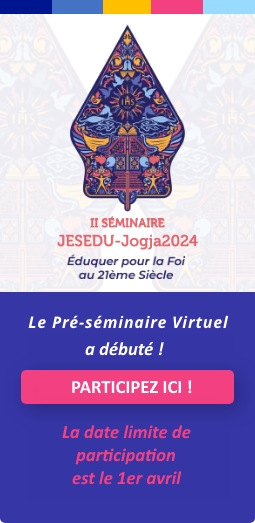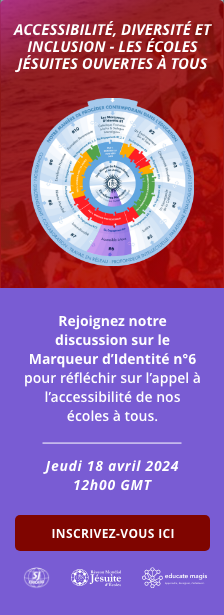This is the first of a series of blogs by Jesuit regents based on Pope Francis’ apostolic exhortation on young people: Christus Vivit. In this first reflection, François Xavier tells us how the pontifical document reaffirmed to him in his mission of spiritually accompanying the young people and reminded him of the « Emmaus » moment he experienced with one of his students on a certain Palm Sunday.
Anyone called to be a parent, pastor or guide to young people must have the farsightedness to appreciate the little flame that continues to burn, the fragile reed that is shaken but not broken (cf. Is 42:3). The ability to discern pathways where others only see walls, to recognize potential where others see only peril. That is how God the Father see things; he knows how to cherish and nurture the seeds of goodness sown in the hearts of the young. Each young person’s heart should thus be considered “holy ground”, a bearer of seeds of divine life, before which we must “take off our shoes” in order to draw near and enter more deeply into the Mystery. (Christus Vivit 67)
When Jesus invites himself to walk with the disciples on the road to Emmaus, the disciples acknowledge, once they have left, that their hearts were burning when Jesus spoke to them… In the ordinary course of our daily lives, encounters can change the course of a life, but very often this is done gently, without frictions… A spark lights up in the heart and it gradually becomes a lamp on our path. During the weekend of Palm Sunday in Taizé, Jean, 17 years old, was for me that “other “ disciple with whom I was travelling that day.
Our conversation started when he asked me: « How did you know you were going to be a Jesuit? ». We had just arrived and I must admit that I was surprised at first by such a question. As a good Jesuit, I ask him to clarify his question because I felt it coming like an iceberg: the submerged ice-block seemed to be much more important than the emerged tip. Here is what he told me: « To talk about vocation, we often hear that you have to hear a call, but I don’t feel called. I didn’t receive a call. I was very happy to prepare for the confirmation and to receive this sacrament in November, but what can I do later? I don’t know yet… But how did it go for you? How were you called?”.
Like the first one, this new second question was difficult to avoid. So I went ahead and told how it went for me. I told him about the initial moment of my vocation when I was touched by Jesus when I was 8 before the Blessed Sacrament in Lisieux. It is impossible to say exactly what happened: deep down in my heart, I knew He was there. The words came to me spontaneously: « Yes Lord, I am yours! ». I have made the choice to give my life to God, to be all his, every day of my life… And yet, it was not yet a question of how this would work in practice… To be a priest? Perhaps… but I’m not sure!
From my childhood until my adolescence, I cultivated this new relationship with Jesus. As nothing out of the ordinary Jesus simply became a friend, a person with whom I could talk, to tell him what I was going through. During that time, two saints also became fellow travelling companions in life: St. Theresa of the Child Jesus and St. Francis Xavier, my patron saint. Their example inspired me. Without knowing it too much, I walked with them… They helped me to grow and face my inner and outer life.
As a teenager, I put all these experience aside. For me, my teenage years was the great age of questioning. I needed to see through my eyes to believe! I was in search for the meaning of life, but also for the meaning of self: “Deep down, who am I? I had to learn to speak in « I » statements, to make personal choices, and to become the main actor in my life… However, this question of the meaning of my life came back to me during my studies, after having a meeting with a religious sister. Then, while I was primarily concerned with having a good time, this religious sister shake me by asking me what Ignatius ask Francis Xavier: « What is the point of winning the world if it is to lose your soul? » [Mt 16:26]. And she didn’t stop there as she asked: “And you, what meaning do you want to give to your life?”
This last question turned me upside-down and changed the course of my life. I was challenged to reassess the order of preferences and to reviewed my priorities in life: (1) Jesus, (2) caring for one’s neighbour through service (which led me back to the Scouts) and (3) spiritual accompaniment (i.e. that realisation that one does not advance alone in faith!) Then what? Well, it took me another 5 years before I joined the Society. First I finished my studies (2 years). Then, I went to Namibia as a volunteer with Solidarités international for 2 years) and subsequently enter the seminary for a year. It was at seminary, during an Ignatian retreat, that the long journey finally made sense: « Come follow me »! [Mt 9:9].
At the end of the story, I had answered for myself but I felt that I had not answered for Jean. An objection emerged from Jean: « Is everyone called? Clearly, I don’t feel called yet and yet I want to do something with my life… and for God too.” It seems to me that I have been much more evasive: everyone is called personally! Everyone baptized is called by God! Vocation is not only about being a priest or a religious. Everyone is called to respond to the call made to them in their lives. For it is first of all an invitation to happiness, to holiness: it is a question of welcoming into one’s life, the very life of God… The invitation I have made to him was, therefore, to be attentive to what makes him happy and to choose according to that…
The conversation stopped there but I felt that Jean was going to stay hungry for more. I had simply broadened the scope of the answer. The latter came, it seems to me, at the end of the weekend, when we met a brother from the Taizé Community. A young man asked him how he came to be a brother of Taizé. Fr Pierre did not elaborate much on the subject. He told her that he had studied engineering and worked in construction and public works. At the time, he made a good living, but that’s not how he wanted to live. He didn’t see any sense in that. He came to spend a few days in Taizé. What he went through? He couldn’t say it: it’s often difficult to say what you can feel. But he left with a little flame in his heart. Oh, not a big thing: a little like when you blow on glowing coal. At first, the flame is barely noticeable. But it gets hot and if we keep blowing, it grows. That is the image he used. Jesus did not tell him what to do: he did not « call » him… He made himself the inner host of his life. And little by little, he became a brother of Taizé…
From this conversation, I keep several learning outcomes:
- First, God speaks to the heart of each person in a unique and particular way. There is are no identical paths to this journey with Him. Rather, there are as many ways to love and be loved as there are people.
- Quite often, we don’t know where we’re going. The path is a daily invitation to be made with the Lord in the Spirit. He is the driving force, this active presence in our hearts and in our lives. The Spirit blows but without us knowing where he comes from or where he is going… It is , therefore, a question of letting himself be led as best as possible.
- Let yourself be led by Him, but allowing for the richness of companionship. The disciples of Emmaus were two. In my case, Jean was that other disciple for me. His question came to put me back in the groove that continues to grow for me. There is an existential stake for everyone, a promise of life and happiness: when God visits us, He lights a fire in our hearts! And there’s plenty of reason to live and to rejoice!
The young people teach us and their questions are our own. Thus, we give thanks for them!
Se connecter ou Adhérer
pour créer et afficher des commentaires

